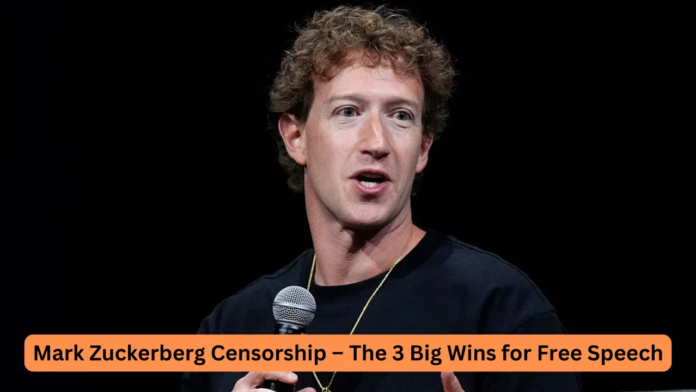Table of Contents
The Silent Power of Influence: Mark Zuckerberg and the Fight against Censorship
Mark Zuckerberg Censorship: When you hear Mark Zuckerberg, you may be thinking of the creator of Facebook, a social media behemoth that has defined our digital existence over the years. But lately there has been a lot of talk around his name regarding Mark Zuckerberg Censorship—a topic that’s been burning up hotly like your phone in the summer sun. In a sincere letter written to the House Judiciary Committee, Zuckerberg detailed his regrets and reflections about how Meta (formerly Facebook) was affected by government pressure. This wasn’t just any letter; it was a bombshell that generated a storm of controversy over freedom of speech, state influence and what lies ahead for content moderation.
Billionaire’s Lament
There are rare occasions when a billionaire tech mogul can admit making errors. Nevertheless, this was the exact thing Mark Zuckerberg said when he wrote to the House Judiciary Committee sometime back. Looking back over the past few years, Zuckerberg admitted that he should have spoken more about the government’s insistence on removing COVID-19 related content. So, being in charge of a company always in the limelight with government enforcers on your case sounds like quite some pressure? It is not surprising then that there are a few things that he wishes would have been done differently.
But this is an important question now? This is because Mark Zuckerberg Censorship confession casts a light on the precarious balance between the freedom of expression and Mark Zuckerberg Censorship in our digital age. Moreover, it raises us a question: to what extent should the government control information we are exposed to and what we share on-line?
The Pressure Cooker: Government vs. Free Speech
The Role of Government
Let’s plunge into the nitty-gritty of things; according to Zuckerberg, Meta was repeatedly pressured by the Biden administration to “censor” COVID-19-related content. Now, this is not some unfounded allegation. We’re talking about senior figures from government directly pressurizing one of the world’s largest social media platforms. And for a company that lives off user engagement and open communication, this kind of pressure feels like trying to run with a fifty-pound backpack.
But really, what does censoring mean here? It means more than just deleting posts or suspending accounts. It involves molding narratives — determining what is true and false, what is right and not acceptable. In addition, when governments assume such roles they tend to blur the line between protecting public health and intimidating free speech.
The Impact on the Policies of Meta about Mark Zuckerberg Censorship.
This government pressure had real life consequences rather than just being theoretical. One case in point was when a New York Post’s article about corruption charges against President Biden’s family was downgraded on the Meta platform prior to 2020 elections. It disappeared from users’ newsfeeds as the said algorithms pushed ahead of purposefully verifying the scam. After this, Zuckerberg confesses that they made a mistake. This is a classic example of “too little too late” where by the time truth came out, damage had been done already.
So, what does this mean for Meta’s policies moving forward? Zuckerberg has made it clear that they will not succumb to pressure in the future. He even stated that Meta has changed its ways as a company so as to prevent such cases from happening again for instance no longer taking down content while awaiting fact checkers in America. It is a daring gesture that raises another question: Is it too late to come back into the public’s trust?
A Strategic Shift: Meta’s Updated Policies on Mark Zuckerberg Censorship
Changes in Content Moderation
In response to these controversies, Meta made some big changes regarding their policies on content moderation. First off they have decided against demoting anything while under review in the US. It sounds like something minor but it shakes up everything within social media platforms. This means the posts of users will not be lost amongst algorithms just because they await fact checks. The move is towards greater transparency and justness concerning how content is dealt with.
However, algorithmic changes are only a part of it. Zuckerberg’s letter indicates a different approach to Meta’s content moderation. It is now more about preserving the platform’s integrity while resisting external pressure. This could be interpreted as Meta’s way of saying that they have taken charge in a world where everyone wants control over the narrative.
Hezbollah, Iran and Israel Zionism: an International Perspective
On the same note, Zuckerberg has chosen not to contribute towards election infrastructure this time round. On that note, do you remember “Zuckerbucks” from the 2020 poll? This was money given to local jurisdictions meant for election infrastructure but it rapidly turned controversial. For instance, critics including Republicans accused him of using these funds to influence election results since they were seen as favoring some areas which tend to vote for left-leaning candidates against others that lean right.
So, no Zuckerbucks anymore,” says Zuckerberg. He is stepping back so he does not appear involved in elections—whether this is a deliberate attempt to avoid trouble or truly trying to keep neutrality is debatable . Yet one thing is certain; he desires to distance himself away from politics at least when it comes to direct donations.
The Reaction: A “Big Win for Free Speech”
The Judiciary Committee’s Response
House Judiciary Republicans didn’t waste any time pouncing on Zuckerberg’s letter as “a big win for free speech.” In some ways, they are correct. It is a momentous point in the unending argument about freedom of expression and governmental encroachment when Meta confessed that Joe Biden’s government forced it to delete content. This goes beyond enhancing free speech; it also increases transparency.
The Ongoing Debate on Mark Zuckerberg Censorship
The ongoing discussion on social media Mark Zuckerberg Censorship will continue for quite some time. Zuckerberg’s memo might just be the catalyst that sparks it up again. On one hand there are those who think Meta and platforms like it have excessive powers to control public conversations. On the other hand, others say that these firms are only doing what is needed in order safeguard individuals from false information and harmful material.
Then, there was also a Supreme Court case last term where the justices tossed out lawsuits against Biden administration’s discussions with social media corporations. It did not directly address First Amendment issues but it did compellingly raise queries about government’s role in overseeing expression on privately-owned platforms. Where do we go from here?
Conclusion: Strategic Moves or Mistakes?
Having delved so deeply into Mark Zuckerberg Censorship, it is clear that it is not always very easy to differentiate between strategy and blunders. While apologizing, Zuckerberg could be seen as tactically positioning himself back into trust or he could also be perceived as a criminal coming too late. The adjustments made in Meta guidelines are definitely in the right direction; what remains unanswered is whether this would change how people would view the firm from now onwards.
The battle over free speech is not over, in the end. However, one thing is clear: Mark Zuckerberg Censorship decisions have set the stage for the coming phase of this continuous saga. Will Meta be a champion of free speech or yet another tech giant that bows to power? Only time will tell.
FAQs
What was Mark Zuckerberg’s position towards government pressure to censor content?
Mark Zuckerberg said he regretted not speaking out more against the Biden administration’s attempt to censor Meta platforms COVID-19-related topics.
How has Meta’s content moderation policy changed recently?
Updated content moderation policies by Meta, including ceasing demotion of U.S.-based contents while awaiting fact-checking.
What were “Zuckerbucks,” and why were they controversial?
“Zuckerbucks” referred to monies contributed by Mark Zuckerberg towards election infrastructure in 2020, which became controversial after being said to influence an election outcome.
What was House Judiciary Committee’s response to Zuckerberg’s letter?
House Judiciary Republicans hailed this letter as a “big win for free speech” and pointed out government intrusion on content moderation.
How was the Supreme Court involved in the debate on social media Mark Zuckerberg Censorship?
The Supreme Court declined hearing a case challenging Biden’s administration recently.

